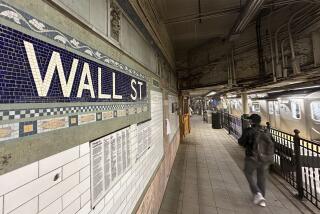Wall Street drifts to a mixed finish after an inflation update

NEW YORK — U.S. stocks drifted to a mixed finish Wednesday after the latest inflation update boosted hopes that more help for the economy will arrive next month through a cut to interest rates.
The Standard & Poor’s 500 index was nearly unchanged and edged up by less than 0.1%, coming off its first loss since a big rally erupted after election day last week. The Dow Jones industrial average rose 0.1%, and the Nasdaq composite slipped 0.3%.
The bond market also was mixed after a report said the inflation that U.S. consumers felt last month was exactly as economists expected. It accelerated to 2.6% from 2.4%, but an underlying measure called “core inflation” did not accelerate. Core inflation can be a better predictor of future trends, economists say, and the as-expected number boosted expectations for help coming from the Federal Reserve.
“Bang in-line core inflation leaves the Fed on track to cut rates in December,” said Lindsay Rosner, head of multisector fixed income investing at Goldman Sachs Asset Management.
The Fed began cutting interest rates from their two-decade high in September to offer support for the job market, hoping to keep it humming after bringing inflation nearly all the way down to its target of 2%. It cut rates again this month, and traders now see an improved probability of roughly 80% for a third cut at its meeting next month, according to data from CME Group.
Those expectations sent the yield for the two-year Treasury down to 4.27% from 4.34% late Tuesday. The yield on the 10-year Treasury, which takes future economic growth into account, fell initially after the inflation report. But it pared its loss and eventually rose to 4.45%, up from 4.43% late Tuesday.
The question is what will happen with rates in 2025. Prior forecasts published by the Fed implied that it could keep cutting rates through next year. But Donald Trump’s victory in the presidential election may have scrambled such plans. Economists say his preferences for lower tax rates, higher tariffs and less regulation could ultimately lead to higher U.S. government debt and inflation, along with faster economic growth.
Although lower interest rates can give a boost to the economy and to prices for investments, they also can give inflation more fuel.
Still, Wednesday’s data was reassuring for the market after a run of stronger-than-expected data on the economy, which could have signaled upward pressure on inflation.
“The market may be concerned that we are at an inflection point, with inflation potentially returning to an upward trajectory,” said Scott Wren, senior global market strategist at Wells Fargo Investment Institute. “We see inflation modestly higher next year. We don’t think today’s CPI data will do much to the market.”
On Wall Street, Rivian Automotive jumped 13.7% after the electric-vehicle company gave more details about a joint venture it’s entering with Volkswagen Group that they had previously announced. The deal’s total size could be worth up to $5.8 billion, which is more than the $5 billion the companies previously mentioned.
Spirit Airlines’ stock lost 59.3%. The airline said in a regulatory filing that it’s still trying to work out a deal to renegotiate the repayment of its debt. If it can reach an agreement, the airline said it could wipe out the company’s stockholders, but it could also protect employees and customers.
All told, the S&P 500 rose 1.39 points to 5,985.38. The Dow added 47.21 points to 43,958.19, and the Nasdaq composite slipped 50.68 points to 19,230.73.
In stock markets abroad, Japan’s Nikkei 225 fell 1.7% after its wholesale inflation rate reached its highest level since July of last year. South Korea’s Kospi sank 2.6% after Samsung Electronics shares fell to their lowest level in more than four years.
Indexes were modestly lower across much of the rest of Asia and Europe.
In the crypto market, bitcoin topped $93,000 as cryptocurrencies generally soared, before falling below $90,000 in afternoon trading. Trump has embraced cryptocurrencies and pledged to make the U.S. the crypto capital of the world.
Dogecoin, a cryptocurrency that’s been a favorite of Tesla’s Elon Musk, also gave up some of its gain from earlier in the day. Trump named Musk as one of the heads of a “Department of Government Efficiency,” or DOGE for short.
Choe writes for the Associated Press. AP writer Zimo Zhong contributed to this report.
More to Read
Inside the business of entertainment
The Wide Shot brings you news, analysis and insights on everything from streaming wars to production — and what it all means for the future.
You may occasionally receive promotional content from the Los Angeles Times.










